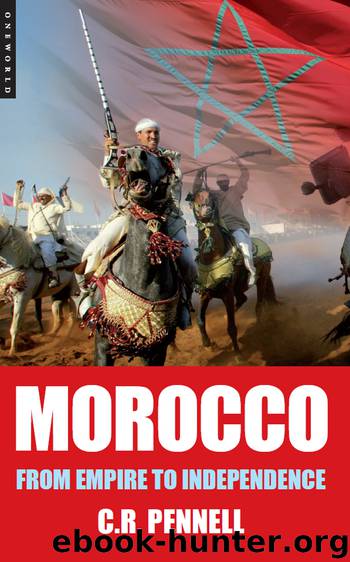Morocco by C. R. Pennell

Author:C. R. Pennell
Language: eng
Format: epub
Publisher: Oneworld Publications
SEVEN
Precolonial Morocco
* * *
When the French took Algiers in 1830 it confirmed the worst fears of many Moroccans. After the Austrian attack on Larache, rumours had spread that “the Christians” would invade the whole country. Although it was Ottoman Algiers that fell, that only lessened the blow. The French had broken the continuity of the Dar al-Islam, and after more than one thousand years Morocco was no longer linked to the Arabic East. With Christian armies on his frontier, and Muslim refugees calling for his aid, Mawlay Abderrahman had to be extraordinarily careful. He felt a moral obligation to help fellow Muslims in distress, but he had no military force capable of fighting the French. His army was a ramshackle affair, whose troops sometimes refused to serve and, when they did, were hard to control. What was left of Mawlay Ismail’s Abid al-Bukhari, despite Mawlay Sulayman’s efforts to rebuild it, had largely vegetated. The mahalla, or expeditionary force, which accompanied the sultan when he moved around the country, might have been able to repress other tribes (and not always then) but it was useless against organised European troops.
Mawlay Abderrahman tried to keep out of any conflict with the French while still keeping his reputation as leader of the jihad. So he congratulated the French general, Clauzel, on his success in occupying Algiers and referred to his own ulama a request for help from the principal inhabitants of Tlemcen. But the ulama declared that they owed them no support: they had sworn allegiance to the Ottoman sultan. Unconvinced, the Tlemcenis wrote back, quoting the ruling of a fourteenth-century legal theorist. They complained that the writ of the Ottoman sultan no longer ran, and declared:
Thus al-Ubbi, in his commentary on Muslim, speaking of a case similar to ours, declared that if the imam is unable to ensure that his orders are carried out in some country, it is permissible to choose another in his place and proclaim him, and any delay in the proclamation will lead to damnation.1
This was an old argument over the legitimacy of power. Following the collapse of the Sa’dis in the early seventeenth century, it had become one of the contentions of Moroccan political life that the sultan should be just and effective in maintaining the independence of the Dar al-Islam. The idea would be heard again over the next hundred years.
Finally, Mawlay Abderrahman did send troops to Tlemcen, but they were so remarkably inefficient that they soon withdrew. That did not end Moroccan involvement in Algeria. The people of western Algeria grouped around Abd al-Qadir bin Muhyi al-Din, the son of the local leader of the Qadiriyya tariqa. He led a successful campaign against the French and set up a small state based at Mascara. Only when the French mounted a full-scale campaign in 1840 did they force Abd al-Qadir out of Mascara. He then called himself the Moroccan sultan’s khalifa (governor) and the ulama of Fez made propaganda for him. When the French forced him to
Download
This site does not store any files on its server. We only index and link to content provided by other sites. Please contact the content providers to delete copyright contents if any and email us, we'll remove relevant links or contents immediately.
| Africa | Americas |
| Arctic & Antarctica | Asia |
| Australia & Oceania | Europe |
| Middle East | Russia |
| United States | World |
| Ancient Civilizations | Military |
| Historical Study & Educational Resources |
The Travels of Reverend Ólafur Egilsson: The Story of the Barbary Corsair Raid on Iceland in 1627 by Ólafur Egilsson & Karl Smári Hreinsson(594)
Pirates of Barbary: Corsairs, Conquests and Captivity in the Seventeenth-Century Mediterranean by Adrian Tinniswood(527)
Phantom Major by Virginia Cowles(398)
The Iberian World by Fernando Bouza;Pedro Cardim;Antonio Feros;(380)
The Battle for North Africa by Glyn Harper(363)
The Animal in Ottoman Egypt by Alan Mikhail(362)
Roman Legionary vs Carthaginian Warrior by David Campbell(355)
Eritrea at a Crossroads by Andebrhan Welde Giorgis(333)
Collapse of a Country: A Diplomat's Memoir of South Sudan by Nicholas Coghlan(330)
The Barbary Wars by Frank Lambert(330)
The End of Barbary Terror: America's 1815 War against the Pirates of North Africa by Frederick C. Leiner(307)
Christianity in Roman Africa by Burns J. Patout Jr.; Jensen Robin M.; & Robin M. Jensen(305)
The Sands of Kalahari by William Mulvihill(287)
A History of the Mediterranean Air War 1940–1945 by Christopher Shores(280)
Morocco by C. R. Pennell(270)
A Line in the River by Jamal Mahjoub(250)
The Holocaust and North Africa by Aomar Boum Sarah Abrevaya Stein(246)
The Making of a Mediterranean Emirate by Rouighi Ramzi;(245)
A History of South Sudan by Rolandsen Øystein H. & Daly M. W. & Rolandsen Øystein H. & Daly M. W(242)
